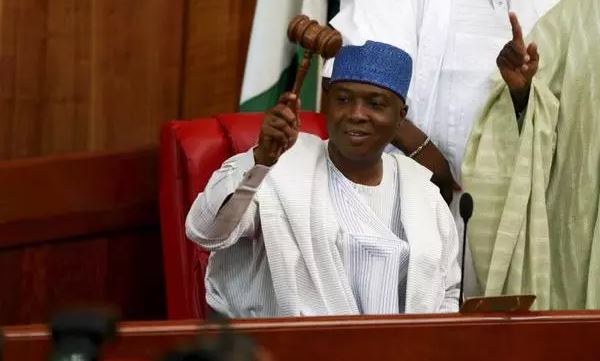NASS Crisis: Saraki Stops Move To Challenge His Election

The Senate President Bukola Saraki, Wednesday, blocked an attempt by a senator to question the legality of the June 9 elections of himself and the Deputy Senate President, Ike Ekweremadu.
Mr. Saraki emerged the Senate President unopposed, while Mr. Ekweremadu of the Peoples Democratic Party, was elected deputy Senate President in a controversial election that saw a faction of the ruling All Progressives Congress, APC, forming an a rare alliance with the PDP.
The development has continued to unsettle the APC and the Senate. At its plenary Wednesday, Kabir Marafa, Zamfara State, made an attempt to question the June 9 elections of Messrs Saraki and Ekweremadu.
Mr. Marafa, relying on Order 110 and 3 (e) (i), of the Senate Standing Order, sought to know which of the Order Books (2011 or 2015) was being used to coordinate the election.
He described the 2011 Senate Standing Order as "genuine and authentic" thereby countering the authenticity of the Senate Standing Order 2015. The election of Messrs. Saraki and Ekweremadu was reportedly based on a revised edition of the Senate rules, version 2015.
"I am still referring to the events of the 9th of June, 2015, in this chamber. I have two Order Books and I am running into confusion, and I think there's a need for the President to rule," Mr. Marafa said.
"Which of the Order Books are we going to use to coordinate the activities of this Senate?" he asked.
Mr. Marafa insisted that there was a conflict in the two books as to the procedure that should be taken for election of presiding officers of the senate. He said as a former Senator, he was unaware of the when the 2011 edition of the rules was amended.
Mr. Saraki however ruled Mr. Marafa out of order, thereby stopping what could have meant genesis of his ouster as well as that of Mr. Ekweremadu. Proffering explanation, the Deputy President of the Senate, Ike Ekweremadu, said that from 1999 till date, the Senate had come with its own rules."There was Senate Rule of 1999, 2003, 2007, 2011 and now 2015. The reason is quite simple.
"If you look at Section 64 of the 1999 Constitution it says that the Senate and House of Representatives shall each stand dissolved at the expiration of a period of four years commencing from the date of the first sitting of the house. "So, the implication is that the rule he was referring to ended with the Senate on the 6th of June, 2015," he said.
Cloud Tag: What's trending
Click on a word/phrase to read more about it.
Tinubu Abikan V.O. Abioye Saudat Abdulbaqi Oko Erin Yomi Adeboye Yusuf Abdulraheem Tunji Oyawoye Solomon Edojah Sadiq Umar Muhammad Yahya Young Progressives Party Isiaka Danmeromu Ahmed Bolaji Nagode Ibraheem Abdullateef Muslimah Entrepreneurship Forum Adeniyi Ojo Leke Ogungbe Haashim Initiative For Community Advancement Mohammed Halidu Yahaya Abdulkareem Grillo IQRA College Olaitan Buraimoh Ajike People Support Centre Democracy Day Salihu S. Yaru Baaziki Sulaiman Ethical College Sheu Ndanusa Usman Charles Ibitoye Abdulahi Abubakar Bata Ahmed Bayero Seed Technologies Muhammadu Gobir Ayinke Saka Oke-Kura Aliyu Olatunji Ajanaku Col. Adedipe Niyi Ogundiran Alabere Code Of Conduct Tribunal Jimba Babatunde Gabriel Fashanu Ilorin Airport Amina El-Imam Kamaldeen Kehinde Ilorin Talaka Parapo Idi-Ape Opolo Global Innovation Limited Muritala Olarewaju Hussein Oloyede Emir Of Lafiagi Adamu B. Yaqubu Peter Obi Mahe Abdulkadir Samuel Elizabeth Keatswa Emir Of Yashikira Okin Malt Yusuf Zulu-Gambari Afonja Descendants Union Ayodele Kuburat Olaosebikan Ahmed \'Lateef Ahman Pategi University Sarah Alade Abdulrazak Shehu Akorede Alumni Association Of The Federal Polytechnic Offa Ayekale Kwara State Coalition Of Business And Professional Associations Rebecca Bake Ben Duntoye Oju Ekun Sarumi Alfa Yahaya Road Bello John Olanrewaju CELF Amuda Musbau Kwara Basketball Association


